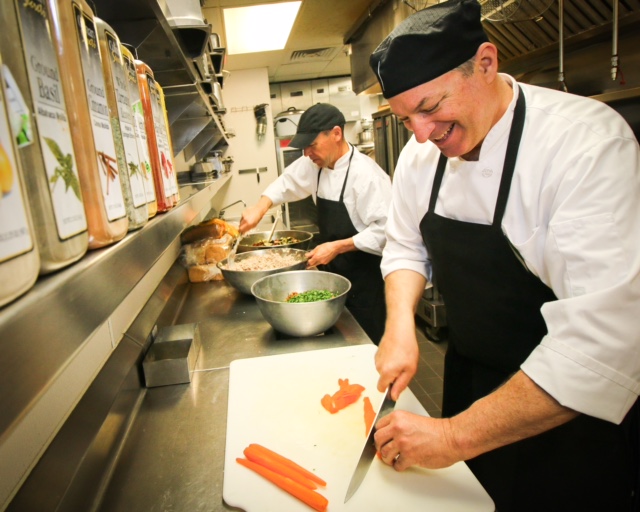If you’ve been out of school for a while, you might be astonished by the fast pace and high volume of lunch service. SAGE Teams can serve up to 1,000 students, faculty, and staff in only a few hours, and many students have as little as 30 minutes to get to the dining hall, select their meal and seating, clean up, and get back to class. This makes for a stressful environment back in the kitchen—so we wondered, how do our Teams manage to thrive under such pressure?
We spent several days with SAGE Teams at venues on the East Coast—McDonogh School (MD), Notre Dame of Maryland University (MD), Cheshire Academy (CT), and Moses Brown School (RI). The leadership lessons the Chefs, Managers, and Team Members taught us apply wherever you work.
Encourage Mise en Place Mise en place is the French culinary term for “everything in its place.” It’s not just setting out everything you need for a recipe in advance—though that’s a must. It’s everything from organizing your shelves so you know where to find your ingredients, to keeping your cookware and surfaces clean so they’re ready to go at a moment’s notice, to having a standard procedure so someone can step in when you’re out sick. Mise en place is a way of life that allows you to be more efficient, calm, and prepared for what’s to come.
Look and Listen Fire, knives, boiling liquids, narrow walkways—kitchens are dangerous places. It’s crucial to be aware of yourself, the space around you, and the people in your vicinity. But in addition to keeping themselves organized, chefs are constantly warning each other of possible danger. It’s not uncommon to walk through the kitchen doors into a din of “Sharp,” “Hot,” “Behind You,” “Spill,” and more. The kitchen is no place for a klutz, and the office is no place for the self-absorbed. Pay attention, look out for your colleagues, and address concerns before they become problematic.
Ask for Help At SAGE, our guests’ safety and enjoyment come above all else, including taking credit. That means our Team Members are constantly asking to have an extra hand or to lend one, and in the end, a dish may “belong” to many people. In your own work, know when you could use a hand, be specific when delegating tasks, and be generous with your thanks. Success isn’t about preserving your ego or enforcing a hierarchy; it’s about completing a job well as a team.
Stay Productive Chefs are the original “self-starters,” so you’ll never walk into a kitchen and see someone slacking. Once your own tasks are complete, there’s always something more to be done—another dish to prep or meal to plan. Ask yourself, “How can I best use the time remaining to help my colleagues and get a head-start on tomorrow?”
Always Be Teaching Take the time to cross-train your team and discuss ways to improve your skills together. Not only will it save you work on busy days or when someone is out sick, but it’ll also help you meet short-term company goals and advance your company’s reputation and your field in the long run.
Recognize & Share Expertise SAGE kitchens pride themselves on hosting daily preservice meetings. These give us an opportunity to come together and discuss the meal service as a whole. Each person discusses the ingredients and preparation of the dishes he or she worked on, which helps the rest of us answer questions about allergens and additional service needs. It also gives individuals a sense of accomplishment and pride in their work, and lets them take the floor as the subject expert. That pride and ownership make a huge difference on a rough day, and help our Team Members feel recognized. Even in large departments, this kind of daily (or weekly, or monthly) check-in can increase employee satisfaction and bring positive energy to your department.









